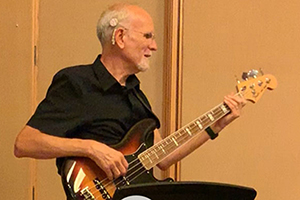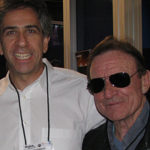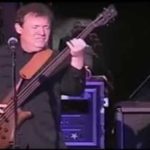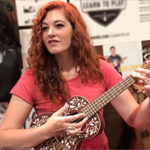How learning bass, despite hearing loss, has led to so much happiness
Exclusive interview with FBPO’s Jon Liebman
August 3, 2020
Originally from Oregon, Joe Dashiell was a huge fan of the popular music from the ‘60s and formed a garage band with some friends. He later played in his high school jazz band. Though his first choice of an instrument was the drums, the slot had already been taken, so Joe was “relegated” to playing bass. But he fell in love with it! When it came time for college, Joe sold his prized Fender Precision, a decision he regrets to this day. He didn’t pick up a bass again till as recently as 8 or 10 years ago.
Tragically, Joe began to lose his hearing in his late 30s. Today, he relies on two cochlear implants which enable him to hear and, once again, play the bass. Currently residing in Florida, Joe has been an active member of For Bass Players Only since late 2018 and is thrilled to be able to play and to groove on the bass. It’s added so much happiness to his life.
FBPO: How would you describe your musical upbringing? Do you come from a musical family?
JD: I had no music in my life. When I was probably 11, I started listening to pop music on the radio. I had a little clock radio I would listen to.
FBPO: I remember those!
JD: Yeah! It was around 1965, ’66, and so I was listening to all the pop music, all the doo-wop music that was comin’ on. I really liked it. I met a couple of brothers and we formed a garage band, playing mostly Beatles songs and some Led Zeppelin. One guy played guitar and the other guy played drums. I wanted to play drums, but the other guy was a better drummer, so I had to play bass. And I fell in love with it!
FBPO: Did you start listening to music differently once you discovered the instrument? Did you pick out the bass parts in songs?
JD: Yes. I’d also taken guitar lessons and they wanted me to do a solo, but all I could think of was bass lines. I was very limited in my knowledge, so every time I was supposed to play a guitar lick, I’m thinking bass! [Laughs]
FBPO: Did you have any bass influences, any bass heroes?
JD: Yes! Jack Bruce, John Paul Jones. Obviously, I listened to a lot of Beatles, but I never listened to Paul McCartney’s playing. I was listening to his singing, so I didn’t focus on his bass playing. He did that and sang so well at the same time. They would play in the Cavern Club, I think what I read was eight hours a day. When you play that much, you’re going to get better and better and better. I wish I could play that much!
FBPO: What kind of job or career did you have?
JD: My educational training was in wood science and technology. Bridges, and beams used in ski lodges, things like that. That’s what I was trained on. I did my master’s thesis on the bending strength of transmission poles. The transmission industry paid for my master’s work, but when I got to work, it was not fun, so I kind of changed careers and started in computers. I eventually got Microsoft Certified Systems Engineer training, but I could never really get any work because I got older. It was a younger man’s work, so I had to stop. I quit.
FBPO: What happened after that?
JD: By then I had lost my hearing and I came across what’s called hearing loops. Hearing loops allow people like me to be able to hear clearly in a setting where someone’s speaking on the microphone. If it’s a big room like a church or a temple or a classroom, sometimes it’s hard to understand what is being spoken, so a hearing loop takes the sound of what’s going into the microphone directly into the hearing aid so you don’t have any of the other ambient noises. It makes it clear, so your understanding is a hundred percent. It’s pretty amazing. That’s what I do. I install those things, so it’s a matter of going into a church, ripping up the carpet and putting the hearing loop carpet down.
FBPO: You do that now?
JD: Yes. I want to do that for another five years. And then I’ll be 70! And then I’ll quit. [Laughs] But if I can do it that long, that’s great.
FBPO: What got you interested in playing bass again?
JD: When I first started, I had acquired a ‘70s Precision bass, and I stupidly sold it! Then I went away to college and I got away from playing altogether. It wasn’t until after my kids were born and older that I decided I needed to pick up again. I thought that if I bought a Jazz bass, they would be a little bit better for me to hear. Now I want to get a Precision bass too.
FBPO: What were you looking to learn when you signed up for a membership at For Bass Players Only?
JD: I was searching the Internet for different things and I came across your site and I thought it looked like it might be pretty good. I’ve seen a lot of the books, like Mel Bay, and they’re just not fun. It’s more of a chore and I just was not happy with it. Then I came across your books and I saw all the reviews and everything. The very first thing I got was your Blues Bass book because that’s what I really like. I listen to a lot of Eric Clapton. Since then, I’ve listened to a lot of B.B. King. Now I’m checking out some Albert King. But I also listened to some of the lesser known blues stars. I really, really like the blues. I spent a lot of time with the Blues Bass book, and I go back to it occasionally. I think the only one of your books I don’t have, besides Jaco books, is the Rock Bass book, so I’m considering getting that too. But I’ve been online to your site so many times, seeing all the different lessons and things like that. I just wish I could get it without tabs.
FBPO: You’re not the first person to say that! I am strongly considering offering an alternative version of the PDFs without tab.
JD: What I do sometimes is take some whiteout and I white out the tab so I can focus on the music. But then I have to spend a lot of time figuring out the fingering!
FBPO: What can you do now that you could not do before you signed up at forbassplayersonly.com?
JD: I’ve learned theory. I really enjoy that. I learned my scales too.
I’ve always kept up my membership to your site, so I refer to it exclusively now. I really get a lot out of it. I think in the Scales & Theory course. I definitely get valuable information from that, but I feel I could use some more. One thing I do like from your lessons and your books is how you start out simple and you progress, more and more advanced, but you maintain the theme that you start out with. I find that very, very helpful and challenging.
FBPO: What other courses have helped you inside FBPO?
JD: The new ones that you have. You have Blues and Jazz, Soloing. And you came out recently with the Soft Rock course, so I took a look at that, but I’ve been focusing on the Blues and the Jazz. I’ll work through those and then I’ll work more on the Soloing course too. Occasionally, I’ll go back to something else because I have your Bass Grooves book. I have your Funk Bass and Funk/Fusion Bass books, and I also have your Bass Aerobics book. One thing I’d like to be able to do is find some other musicians to play with and form a band, but I have no idea how to get started with that because I don’t know anybody else.
FBPO: I know I’m not the only bass instruction site on the Internet. What made you decide on For Bass Players Only, rather than any of the other sites?
JD: I was looking at a lot of different things and I was unhappy, still unhappy, with a lot of the Internet stuff. Some are probably a little better than others. I came across your site and I saw some of the reviews and some of the books that you had and I was quite impressed. Of course I read your bio and so I started looking more and more into that. Then I saw For Bass Players Only and I joined up. Thank you for doing this. It’s absolutely a great website. Your lessons and books are absolutely incredible and I’m so happy to be a part of it.
FBPO: And I’m happy to have you!
JD: [Laughs] I get a lot out of it. I realized I still have a long way to go with the information that you provide, but it has really made a huge difference to me and my ability to play. I continue to go back to your online lessons and refer to your books. I like how I can download the PDFs of each lesson. I have a book of those. I’ll go online and see what you’re doing, and I’ll start playing that over and over. It’s been absolutely wonderful. I can’t say anything more than it’s been the absolute best site to go to for learning bass and I highly recommend it!
FBPO: I’ve always been very interested in ways deaf people can enjoy and appreciate music. I interviewed Mandy Harvey a while back. She speaks, she sings, she even plays the bass, despite the fact that she’s completely deaf.
JD: The thing about the bass is that it’s felt. I could feel it booming. People don’t hear it, but people can feel the music and that lets them enjoy it if they can’t hear. It’s surprising how the cochlear implant can help people who are deaf. I’m very thankful for mine because without them, I’m stone deaf. I’m really thankful that I can hear music and play it while I’m listening to it. That’s really good.
FBPO: Are you involved with any groups or organizations that deal with deaf or hard of hearing people?
JD: I’m involved in the Hearing Loss Association of America. I started the Miami chapter and I ran that for a while as the president. I still go to those meetings. Since the virus, they’ve been having Zoom meetings with several hundred people online across the country. It’s pretty amazing. And there are some cochlear implant user support groups that I go to.
FBPO: If there’s anybody in my audience that wants to support the cause or be a part of it, what can they do?
JD: Nothing formally. I know a lot of the cochlear implant companies talk about the ability to hear music. That was one of the reasons why I chose the company that I went with, but there’s three companies in the U.S. that provide cochlear implants. I’ve known several people who say they have difficulty hearing music and I was surprised because it was one of the first things I could hear. In fact, when I got my first cochlear implant, the very first thing I heard, music, listening to it in the car, was the bass line.
FBPO: I was waiting for you to say that!
JD: As a bass player, I really enjoyed that! That was so amazing to me that some of the very first sounds I heard were the bass. And I was able to recognize the song. It was a Beatles song, so I knew it. That was pretty cool. But to have a meeting that’s all about music, that would be a very, very interesting thing to have. I’ll have to check into that. I’ll get back to you and maybe we can do something where you’re speaking to the group. That would be very interesting. I’ll do some checking and see what we can do in that regard.
FBPO: If there’s a chance to speak to a group in Miami, maybe we could schedule it for sometime in December or January?
JD: [Laughs] Yeah! Except it would be an online meeting.
FBPO: Oh well [Laughs]. Seriously, I’m very passionate about the subject and I’m always happy to learn of ways to get involved in it.
JD: I see that a lot of musical rock stars have lost their hearing. Pete Townshend, and a lot of people have stopped performing because they’ve lost their hearing. Huey Lewis, Phil Collins. It’s sad that people have lost their hearing. I’m sure that’s what attributed to mine. I went to all those rock concerts. [Laughs] It surprised me. I would go with my buddies and I’m the one with the hearing loss, not them! [Laughs]
See Jon’s blog, with key takeaways from this interview, here.






My name is Ray. I was Joe’s lawn guy for about 15 yrs before I relocate to Atlanta. I could remember cutting the lawn, I would stop to take a break and hear Joe practicing on the bass. I saw and heard the dedication and the passion he had for the bass. I’m also a bassist so I’m really proud to se this article about someone I’ve known for the last 15 years. Keep up the great work joe.